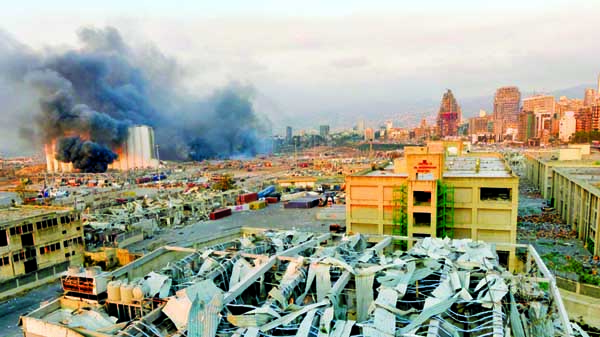
News Desk :
At least 100 people were killed and 4,000 wounded in a massive explosion that shook Beirut on Tuesday, Lebanon’s state-run media reported, citing the Red Cross.
Hundreds have been reported missing, raising fears that the death toll will rise, Lebanon’s Health Minister Hamad Hassan said Wednesday.
He said the explosion also added to the country’s health care system crisis as it has been already struggling with the Covid-19 pandemic.
It’s still not exactly clear what led to the ignition that wiped out entire streets across the seaside capital.
But Lebanon’s Prime Minister Hassan Diab said an investigation would focus on an estimated 2,750 metric tons of ammonium nitrate which is typically used as an agricultural fertilizer, had been stored for six years at a warehouse in the port of Beirut without safety measures, “endangering the safety of citizens,” according to a statement.
Beirut’s governor said the explosion caused up to $5 billion in damage, but at this point, the full extent of the damage is yet to be known. Countries around the world have offered condolences and pledged aid for what the Lebanese Red Cross is calling an “unprecedented and very large” disaster.
At least 300,000 people have been displaced from their homes by Tuesday’s devastating explosion, Beirut’s governor Marwan Abboud said in an interview with Jordan’s state-owned channel Al Mamlaka.
“There are more than 300,000 Lebanese citizens unable to sleep in their own homes,” Abboud said during the interview, adding, “Half of Beirut’s population have homes that are unliveable for the foreseeable future – for the next two week.”
The Lebanon capital’s 4 million residents woke Wednesday morning to the full horror and scale of the damage to their city, lives, and livelihoods.
Images and videos from the immediate aftermath of the blast show homes destroyed and covered with shattered glass.
The explosion also damaged 90 per cent of the hotels in the Lebanese capital, state news agency NNA reported Wednesday, citing Pierre Achkar president of Lebanon’s Hotel Federation for Tourism. The port area was severely damaged by the blast.
Beirut has attracted increasing numbers of tourists in recent years, with Lebanon drawing two million visitors in 2018.
Meanwhile, rescuers searched for survivors in Beirut Wednesday after a cataclysmic explosion that plunged Lebanon deeper into crisis.
The blast, which appeared to have been caused by a fire igniting 2,750 tonnes of ammonium nitrate left unsecured in a warehouse, was felt as far away as Cyprus, some 150 miles (240 kilometres) to the northwest.
The scale of the destruction was such that the Lebanese capital resembled the scene of an earthquake, with thousands of people left homeless and thousands more cramming into overwhelmed hospitals for treatment, reports AFP.
“We’ve had some dark days in Lebanon over the years but this is something else,” said Rami Rifai, a 38-year-old engineer, speaking to AFP from a hospital where his two daughters were receiving treatment after sustaining cuts despite being half a kilometre from the seat of the blast.
“We already had the economic crisis, a government of thieves and coronavirus. I didn’t think it could get worse but now I don’t know if this country can get up again. Everyone is going to try to leave. I will try to leave,” he said, his voice choked by tears.
In the areas closest to the port, the amount of destruction caused by the long years of civil war between 1975 and 1990 was achieved in a second by a blast that levelled buildings within a radius of several hundred metres.
One resident of Mar Mikhail, one of the most affected neighbourhoods, said she saw bodies strewn in the middle of the street, apparently thrown off balconies and rooftops by the blast.
Many people were watching and filming with their phones after an earlier and smaller explosion was heard in the port and ignited a fire.
The resulting footage, which was widely shared on social media, shows a ball of fire and smoke rising above Beirut and a white shockwave engulfing everything around it.
The mushroom-shaped explosion – which seismologists said was logged as the equivalent of a 3.3 magnitude quake-and the scope of the damage drew nuclear analogies in many people’s accounts of the tragedy.
“The Apocalypse” read the headline of L’Orient-Le Jour, the main French-language daily in Lebanon, a country that has seen its share of explosions in its recent past, but none quite this big.
The embattled government of Prime Minister Hassan Diab described the circumstances at the port that led to the explosion as “unacceptable” and vowed to investigate.
“Those responsible for this catastrophe will pay the price,” he said.
Messages of support poured in from around the world for Lebanon, whose economy was already on its knees after defaulting on sovereign debt earlier this year.
A crippling devaluation has sent poverty levels soaring to an estimated 50 percent of the population and for a country so heavily reliant on imports, the obliteration of the main port signalled more hardship ahead.

